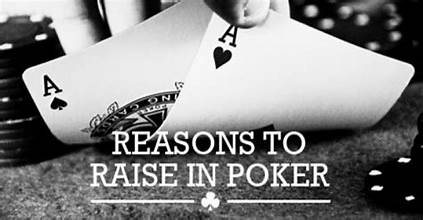REASONS TO RAISE IN POKER
WHAT ARE THEY?
I have read dozens of poker strategy books. Nearly everyone will speak extensively about pre-flop raising and re-raising. – stating a variety of ‘Reasons To Raise in Poker’. Then it will be the same advice for post-flop. Some will say to “always” raise pre-flop if you are going to enter the hand. Others say to raise with any two suited cards (which you will have 24% of the time), any two connectors (dealt 16% of the time), any AX (dealt 11% of the time), and any pair (dealt 6%) of the time. That’s a lot of raising.
Then there are those that will say only raise hands such as listed above, from late position, such as Gambling.com. I am more inclined to agree with Gambling.com. That said, it’s still situational and sometimes correct to just call.
Correct Poker Strategy, according to some, says to “always” raise pre-flop. “Always” is a very strong word. This would mean that no other play is acceptable or correct. But, I keep saying everything in poker is situational, that there is no concrete rule as to the correctness of any particular action or inaction. So, which is it, hard and fast rules, or actions depicted by a particular situation?
In all the pages and post contained in Pokerrailbird.com, you can’t find even one instance of my supporting a “rule”, for anything. As stated many times, I don’t believe there are iron-clad rules for poker. As we have all seen, there are many poker strategy books that will provide rules for every element of play. Today, I am only going to address this one, the rule of raising, at any point in the hand.
.
POKER STRATEGY - TO RAISE OR NOT TO RAISE

Most Poker Strategies say to always raise pre-flop if you are going to enter the hand, particularly from late position. Okay, so we are on the button with 2s,2d. There are only twelve pair that beat our hand, never mind the draws. The probability of an over-card on the flop is 100%. The chance that someone holds a bigger pair in a nine-handed game is what? Nine players dealt in, and there are only 12 pair that beat ours. So that’s 12X9=108/2=54% chance of a bigger pair. It checks around to you. What do you do?
I think that to raise, regardless of what the alleged correct Poker Strategy says, and open the betting back up to the entire table, well, maybe it’s not such a good idea. What happens if you get re-raised? Perhaps it’s more prudent to just call and see the flop. If you flop a deuce, then you are golden. If you don’t, it’s an easy fold and you aren’t out of anything but the cost of the blind. Alternatively, you can raise 3 or 5 times the big blind, get called in four spots, see a flop of Ah,9h,10s, and see how that works out for your raise.
How many times have you seen the pre-flop raiser fold to a bet in front of them after the flop? Does it not make you curious as to what he raised with? I see it all day, every day, and yes, I play nearly every day.
How Much Do We Raise, Pre-Flop?
Back to our pocket deuces. Maybe we fell and hit our head before the game, or we’ve been drinking or have temporary amnesia, but whatever the reason, we raise. How much do we raise? The “rule” is between 3 and 5 times the BB. That’s fine, rule or not. But what would you do if those deuces were Kings?

Would you raise 10 times the BB, or more, or less? Before I address that, a question. What does the strength of your hand have to do with how much you raise? According to Annie Duke, author of “Decide To Play Great Poker“, nothing. She says that you need to determine what size raise works, (never more than 5 times the BB) then stay with that regardless of your hand strength. Why never more than 5 times the BB? Because it puts too much mathematical pressure on your hand. What does that mean? (And no, it’s not a rule, it’s a mathematical equation)
If you raise, say 3X the BB, you have to win 45% more often than normal, in order to break even. I’m not going through all the math, but a pre-flop raiser will win over 60% of the pot he plays. So you can see a 3X raise makes sense. A 5X raise means you have to win 65% of the pots played, meaning that anything over 5X BB raise puts too much mathematical pressure on your hand to win. In order words, long term, it’s a losing proposition.
.

Poker Strategy – Why We Raise
How many times have you seen a player raise, and say “just a little pot sweetener”, or something similar. First, I don’t much believe that. If a player is raising without having a premium hand or a strong draw, why would he say anything? Think of it this way: if you are raising, do you want to draw additional attention to yourself? I don’t, regardless if I am bluffing or have a powerful hand.
If you were in a hand, and you raised, say 4X the BB and I asked you why you did that, could you tell me? Would you be able to verbalize a solid reason for the raise? I don’t mean to “build the pot”, or “a little sweetener”, etc. I mean a strategic reason. If you can’t, then you may not should have raised. Anytime you are putting more chips in the pot than is required, you need to be able to explain why, even to yourself.
As mentioned earlier, would you raise more or less with AA than with 9,9? If the answer is yes, why? If I raise big with gigantic hands, and smaller with medium-strength hands, or vice versa, how long before everyone figures that out? I am not sure about the games you play in, but in the ones I play in, pretty frickin fast.
There are really only three reasons to raise:
- To thin the field
- To gather information
- To take the lead
Now That I Raised
So now that I have raised, what happens? First, if we choose the correct raise amount, we will get some folds, thinning the field. For those players that call, we get some additional information regarding their hand strength. Plus, most likely, we will take the lead in the next betting round.
Why do I say we will take the lead? Because, almost always, if there is a pre-flop raiser, once the next betting round begins, it’s almost always “check to the raiser” by the players in front of the original raiser. If not, and someone bets, then that’s a weak lead, normally and serious consideration should be given to calling. Again, it depends on the board, your position, hand strength, players to act behind you, etc.


Summary
Poker is a game of making decisions with incomplete information, which is what makes everything in poker situational. I am not advocating to raise, or not to raise in any particular situation. Correct Poker Strategy regarding raising, or anything else, is making the best decision possible, based on the information we have.
I will say that by not raising, you have no idea as to where you are at in the hand. You don’t have any more information after your opponents limped in, than you did before they acted. Limping in also encourages other limpers, as they are now getting better pot odds to call. Limping also creates a limp fest, adding to the difficulty of decision-making.
As stated earlier, a good poker strategy would say there are also times when it’s best to limp. Think of it this way: if limping in is your best option, by all means, limp away. But don’t be limping with hands that any good poker strategy would say you should not be playing in the first place, just because you can. By the same token, if raising is your best option, because you need to thin the field, gather information, and take the lead, then do so. Just don’t take any action that isn’t in your best interest because of someone else’s rule.
Please don’t forget to complete the Contact Us Form. This will ensure that you receive our Newsletter and notice of updates to Pokerrailbird.com
.
